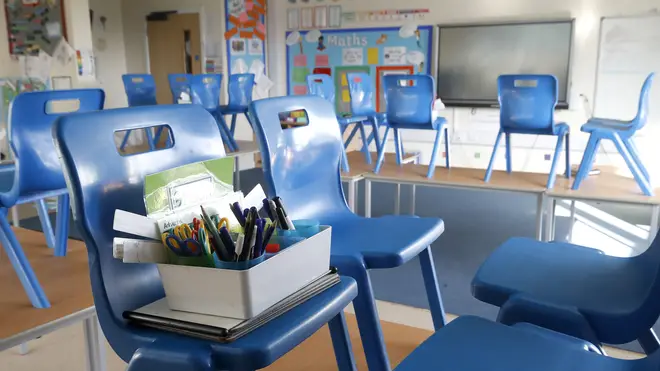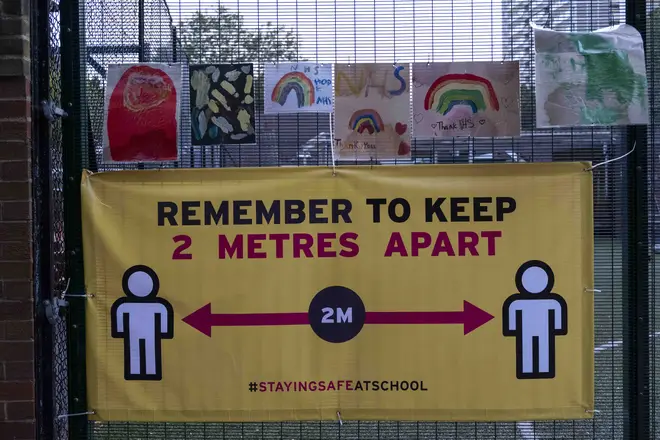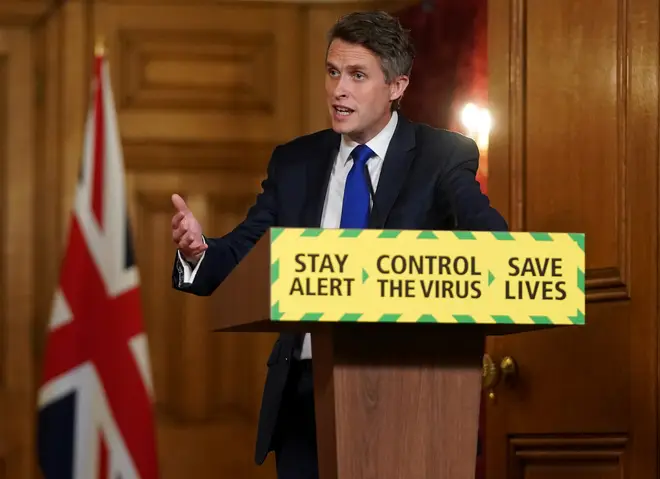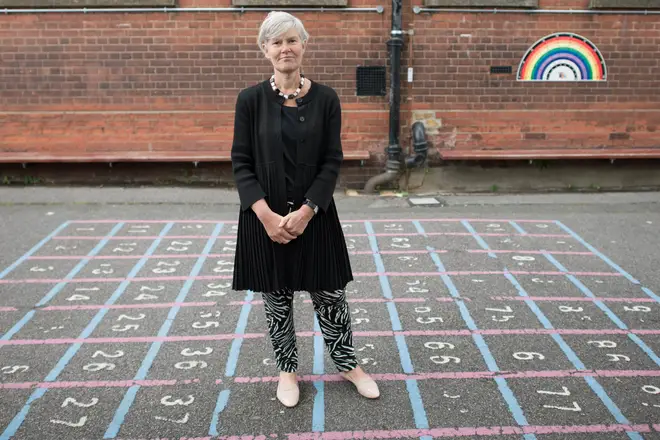
Ian Payne 4am - 7am
2 July 2020, 11:00

New government safety rules for schools in England have been published, with classes and year groups to be kept apart in separate "bubbles".
Under new rules, school attendance will be compulsory, with penalty fines if parents do not comply.
Earlier this week, Education Secretary Gavin Williamson said that parents in England who do not send their children back to school in September will face fines "unless there's a good reason for absence".
It also states that if a school has two confirmed coronavirus cases in a two-week period then all the pupils in that "bubble" will be sent home.
In some cases, the whole school will need to be sent home.


Schools will be given testing kits to give to parents if there is an outbreak or children show symptoms. Testing will focus on the infected person's class, followed by their year group, then the whole school if necessary, the guidance says.
The plans, which were issued by the Department for Education, state that "given the improved position, the balance of risk is now overwhelmingly in favour of children returning to school".
It also states that schools will operate with all pupils back full time, which can be achieved through the expansion of the "protective bubble" system already in use.
It will bring schools back in line with early years providers in England, who have been able to open more widely to children since June 1, but there have been restrictions on group sizes.

Maltings Academy school's plans for returning students
The new rules for autumn will mean:
- Children will be grouped together in "bubbles" that will not mix
- "Bubbles" will be classes in primary schools, and year groups in secondary schools
- "Bubbles" will be banned from socialising during the school day
- Separate starting, finishing, lunch and break times for "bubbles"
- Regular hand washing
- Isolation of those with symptoms, who will be told to stay away from school
- Large events like school assemblies banned
- Only forward-facing desks
- Separated "bubbles" on school buses
- Discouraging the use of public transport wherever possible

New Rickstones Academy school's plans for returning students
Other regulation set out includes teachers being told to distance themselves from each other and older students when a full return to school takes place in September.
Secondary school staff who need to move between classes and year groups should try and keep their distance "as much as they can" - and ideally at two metres from other adults.
Older children should be kept apart from other groups and staff where possible, and they should be encouraged to keep their distance within groups.

Schools in Wales set to open today
Speaking in parliament, the Education Secretary said: "These past three months have been some of the most challenging for schools parents and children.
He said that what schools have achieved during lockdown is "remarkable" but students experienced "unprecedented disruption".
Mr Williamson said that the government expects schools to move back to a broad and balanced curriculum.
He also said exams are expected to go ahead in the summer of 2021.
"In these challenging times we are committed to the nation's children’s to have not only a safe education, but an excellent one," he confirmed.
Gavin Williamson told MPs "education recovery is critical for this generation" of school children, adding in a statement to the Commons: "Returning to normal educational routines as quickly as possible is critical to our national recovery too."
The Education Secretary also said the Government is working to ensure all pupils can return to schools and colleges full-time in September, noting: "With Covid-secure measures in place so they have the opportunity to thrive and fulfil their full potential."
Mr Williamson said schools will continue minimising contact between children, including through grouping them in "bubbles" and encouraging older children to distance.
He went on: "As a minimum, this will mean keeping whole year groups in schools and colleges separate.
"This is in addition to the other protective measures we know are so important for infection control, such as regular cleaning and hand washing."
He said the Government will provide all schools and colleges with a small number of home testing kits.
Mr Williamson told MPs: "By the start of the autumn term we will provide all schools and colleges with a small number of testing kits.
"These will be taken home by children or staff who develop symptoms while on site but who would struggle to access a testing centre. This is so that they can have a test quickly and that they can get results back quickly.
"All schools will have direct access to support and advice from their local Public Health England health protection team to deal with any cases that may occur. They will be advised on what steps need to be taken."
There will be no "dumbing down" of the curriculum in the next academic year and pupils will be taught a "full, broad and balanced curriculum" including arts and sports.
Responding to his Labour opposite number Kate Green's question about whether arts subjects would be prioritised, Gavin Williamson said: "I want to assure her in terms of the curriculum about the importance that it has to be a full, broad and balanced curriculum.
"And that includes the arts and humanities. It includes sports. It includes so much because we recognise that to give children the best opportunities to succeed in life they have to have that breadth of curriculum and we should not be seen to be dumbing down or reducing it.
"We have to give children choices. That is good for their future attainment, their future life chances but also for their mental health as well."

Kate Green MP, Labour’s Shadow Education Secretary, responded earlier to the guidance issued today on children’s return to schools in September.
She said: “All children must be safely back in school by September. By then, they’ll have suffered a six month gap in their learning.
"Officials in the Department for Education have warned this could lead to a widening of the attainment gap of up to 75% as children from disadvantaged backgrounds have lacked access to resources to learn at home.
“Teachers, school leaders, staff, and parents have achieved a huge amount throughout this crisis, and now they desperately need the support of the government.
"With only three weeks to go before the end of term, there is an enormous amount to prepare: finalising health and safety arrangements, ensuring there is space for children to learn, restructuring the school day and providing reassurance to parents.
“The Government has been asleep at the wheel, but heads and staff cannot be left to do this alone. Labour is calling for a cross-party taskforce to focus urgently on getting the necessary arrangements in place so that all students can return safely in September.”

Education Union Secretary says social distancing is a 'key determinant' on whether schools should open
It comes as Leicester has been placed back into lockdown following a localised surge in Covid-19 cases, forcing schools to close their doors to all but a handful of students once again.
The nation might think it has got the hang of the lockdown rules by now, but the government has also provided more guidance on what schools should do if local restrictions are reinforced.
Priority groups only
Children of key workers can attend school but are allowed to remain home if their parents or guardians prefer and are able to make alternative arrangements.
Students vulnerable because of family circumstances are expected to attend school and those on an education, health and care plan due to their special educational needs are also expected to attend.
All other students are required to stay at home.
Walk, cycle or scoot
Parents are asked to bring their children to school on foot, or encourage them to cycle or scoot wherever possible to try and cut pollution levels which might be linked to Covid-19 infection.
Families should avoid public transport, but if this is not possible then all those over the age of 11 are required to wear a face covering while travelling.
Keep it clean
Schools must encourage regular handwashing and good hygiene among students, as well as teaching in small, distinct groups to reduce the risk of infection.
Teachers who fail in this duty can be threatened with having to listen to the Peppa Pig "wash your hands" song on repeat.
Buildings must also be cleaned thoroughly and regularly.
Think flexibly
Schools and other establishments in each area are asked to work together to make sure every child who needs a space can get one.
Where necessary, places in a different school or nursery should be made available.
Meals
All students who are entitled to a free school meal should get one - even if they are not allowed to attend school during the lockdown.
The Government suggests providing meals or food parcels via a school's existing food provider, using the national voucher scheme or providing alternative vouchers for local shops or supermarkets.
Curriculum
Schools have been told that providing children with a safe environment during the lockdown is the main priority, and that any teaching is a bonus.
The Department for Education guidance states: "No school will be penalised if they are unable to offer a broad and balanced curriculum during this period."